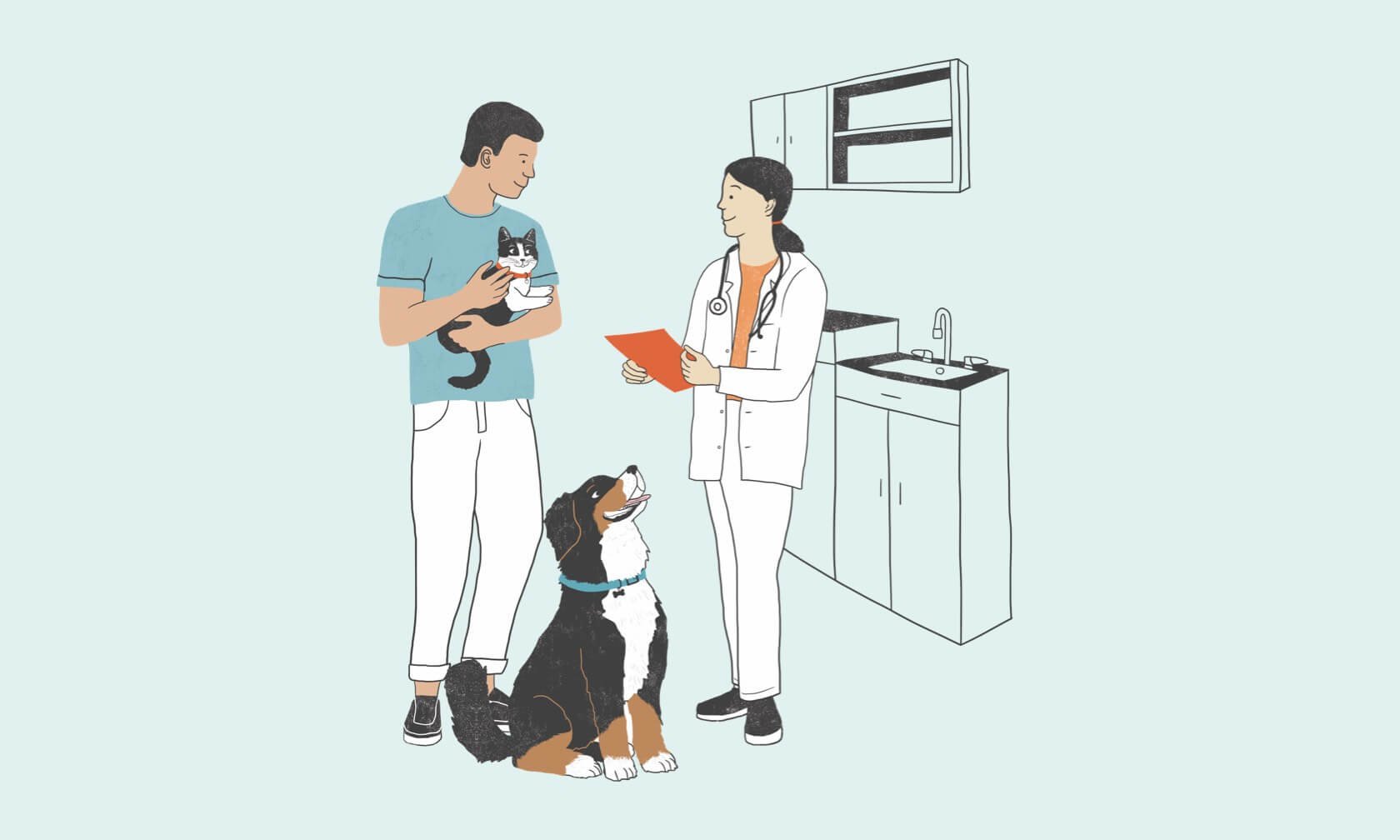In the United States, gallbladder disease is one of the most common conditions affecting people1. Did you know that this human condition can also affect dogs? While it’s not as common in dogs as in humans, it does occur in dogs. Therefore, it’s important to be aware of the different gallbladder issues that can impact your dog, including symptoms to look for and treatment options.
What Does Your Dog’s Gallbladder Do?
Even though the gallbladder is a small, sac-like organ almost hidden within the lobes of the liver, it’s an important part of the digestive system.
The liver secretes bile (a thin, yellowish-green, acidic fluid) throughout the day, which is stored and concentrated in the gallbladder. The gallbladder contracts and releases bile into the intestines when needed, especially during and after a fatty meal. The bile then helps with digestion and the absorption of lipids (fats) and fat-soluble vitamins in the small intestines.
Besides aiding in digestion, bile is also essential for:
- Helping with the removal of certain waste products
- Neutralizing stomach acids
- Helping move food down the small intestines for further processing
As you can see, bile is critical to your dog’s health in many ways. Therefore, any gallbladder disease that affects its movement can have serious implications for your dog’s well-being.
What are Some Common Gallbladder Issues that Affect Dogs?
Multiple conditions can impact your dog’s gallbladder. Any of these would fall under the category of gallbladder disease. The three most common are:
- Cholecystitis. This condition occurs when the gallbladder becomes inflamed due to infection, blockage by stones or debris, or even tumors.
- Gallstones. Cholesterol, bilirubin, and other substances can form stones in very saturated bile. In some cases, the stones just float around in the gallbladder. In other instances, they can cause a blockage of the ducts resulting in the backup of bile.
- Gallbladder mucoceles. When bile-laden mucoid material builds up in the gallbladder due to disease and/or genetics, mucocele (fluid-filled swelling) develops. This causes a stretching of the gallbladder, making it larger than normal, which can result in inflammation, tissue death, and rupture. Secondarily, it can cause sludge buildup in the gallbladder.
Less common conditions include:
- Gallbladder rupture. Severe trauma or inflammation can cause the gallbladder to rupture and the bile to leak into the abdomen. It can also be the result of cancer or certain parasites.
- Choledocholithiasis. This occurs when the bile duct has stones or other debris, and the flow of bile is blocked causing the bile ducts to become inflamed.
- Cysts. Cysts, typically filled with mucus, can block bile flow into and out of the gallbladder. These can occur alongside mucoceles.
- Tumors. Cancerous tumors are rare (most are benign) and generally seen in older dogs. The gallbladder, liver, and bile ducts can all be invaded by tumors resulting in secondary issues.
- Cholangiohepatitis. Though rare in dogs, this is an inflammatory condition caused by bacteria or a virus, affecting the gall bladder, bile ducts, and surrounding liver cells.
- Congenital abnormalities of the gallbladder. When a dog is born with a condition that affects the development of part of the body, it is called a congenital abnormality. Two such issues that can affect the gallbladder are gallbladder agenesis (lack of a gallbladder) and biliary atresia (lack of bile duct development in the liver). Gallbladder agenesis doesn’t cause problems unless the bile ducts are missing within the liver. Biliary atresia is uncommon but, if present, has a poor prognosis for the young pup.
Are Some Dogs More Likely to Have Gallbladder Disease?
Gallbladder disease has been noted in almost every dog breed, including mixed breeds. However, certain breeds seem to be at a higher risk, including2:
- Chihuahuas
- Cocker Spaniels
- Dachshunds3
- Miniature Schnauzers
- Poodles
- Shetland Sheepdogs
Older female dogs are also at higher risk.
In addition to sex, age, and breed, some other potential causes of gallbladder disease in dogs include:
- Obesity
- Poor diet high in fat or cholesterol
- Medications
- Gastrointestinal disorders
- Certain diseases including liver disease, Cushing’s disease, hypothyroidism, and pancreatitis
What Are the Symptoms of Gallbladder Disease in Dogs?
Common signs of gallbladder disease include:
- Vomiting
- Diarrhea
- Change in appetite
- Lethargy
- Abdominal pain
- Abdominal swelling
- Weight loss
- Fever
- Jaundice (the whites of the eyes, skin, mucous membranes, and inner ear develop a yellowish color)
How is Gallbladder Disease Diagnosed in Dogs?
The most common signs of gallbladder disease often mimic those of other diseases. Therefore, diagnostic testing is often required to determine that the gallbladder is the main cause of illness. Such tests include:
- Blood tests – CBCs, chemistry
- X-rays
- Ultrasound
- Removing a small sample of the masses and fluid within the gallbladder using a syringe and needle
What Are the Treatment Options for Gallbladder Issues in Dogs?
Treatment options vary based on the type of the issue and its cause, but there are common treatments that address symptoms, infection, and the more general causes. They include:
- Medications
- Antibiotics
- Anti-inflammatories
- Anti-nausea
- Appetite stimulants
- Pain
- Gallbladder support supplements
- Surgery (removal of the gallbladder, tumor, etc.)
Your veterinarian may recommend additional treatment based on the underlying cause of your dog’s gallbladder issues. Treatment is essential because if gallbladder disease is left untreated it can be life-threatening.
ZPC-02526
Prevalence and ethnic differences in gallbladder disease in the United States. National Library of Medicine. https://pubmed.ncbi.nlm.nih.gov/10464139/. Accessed October 17, 2022.
Dogs Get Gallbladder Problems, Too. Morris Animal Foundation. https://www.morrisanimalfoundation.org/article/dogs-get-gallbladder-problems-too. Accessed October 17, 2022.
Gallbladder Mucocele in Dogs: What You Need to Know. Dr. Buzby’s Blog. https://toegrips.com/gallbladder-mucocele-in-dogs/. Accessed October 17, 2022.



